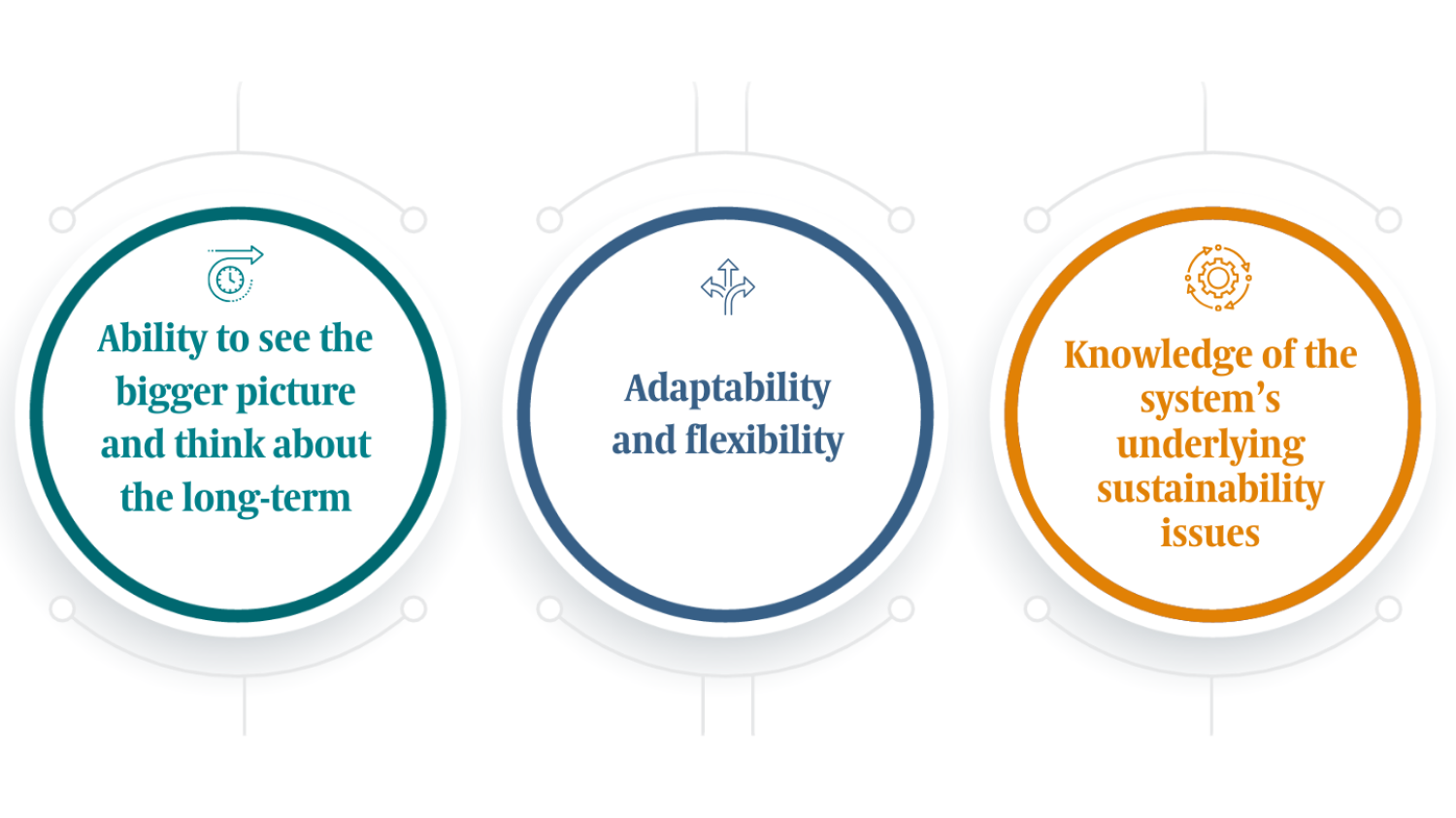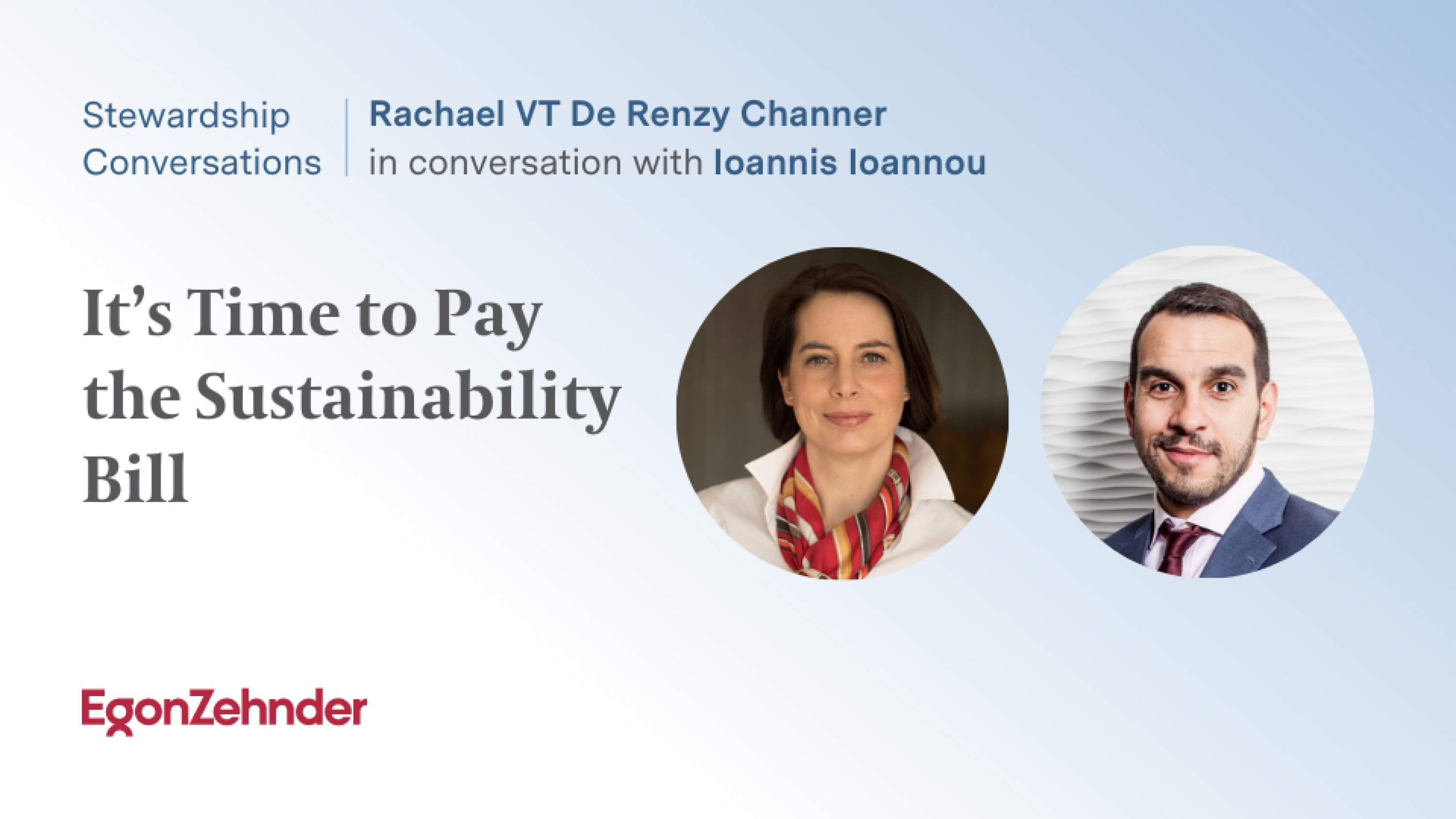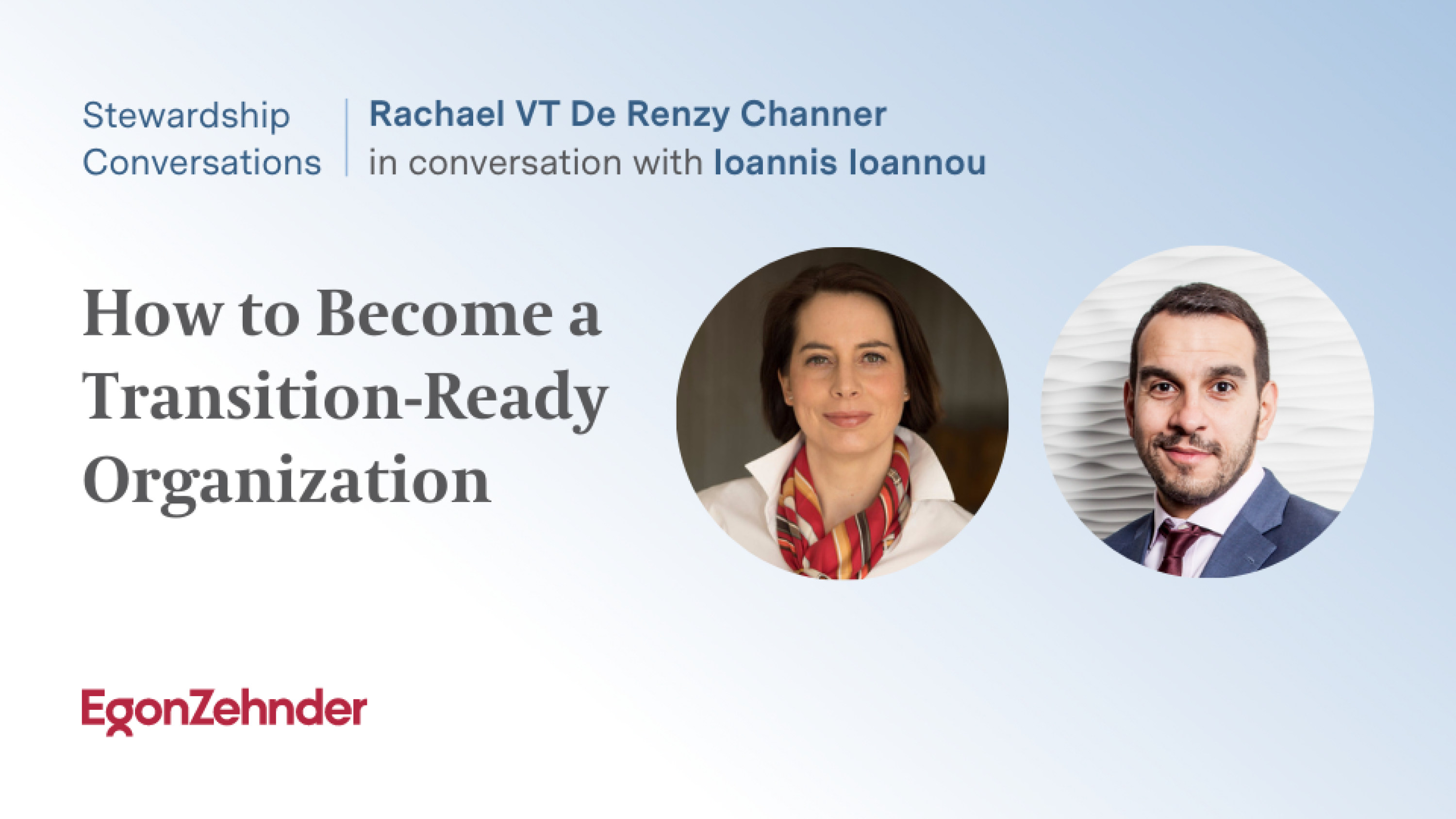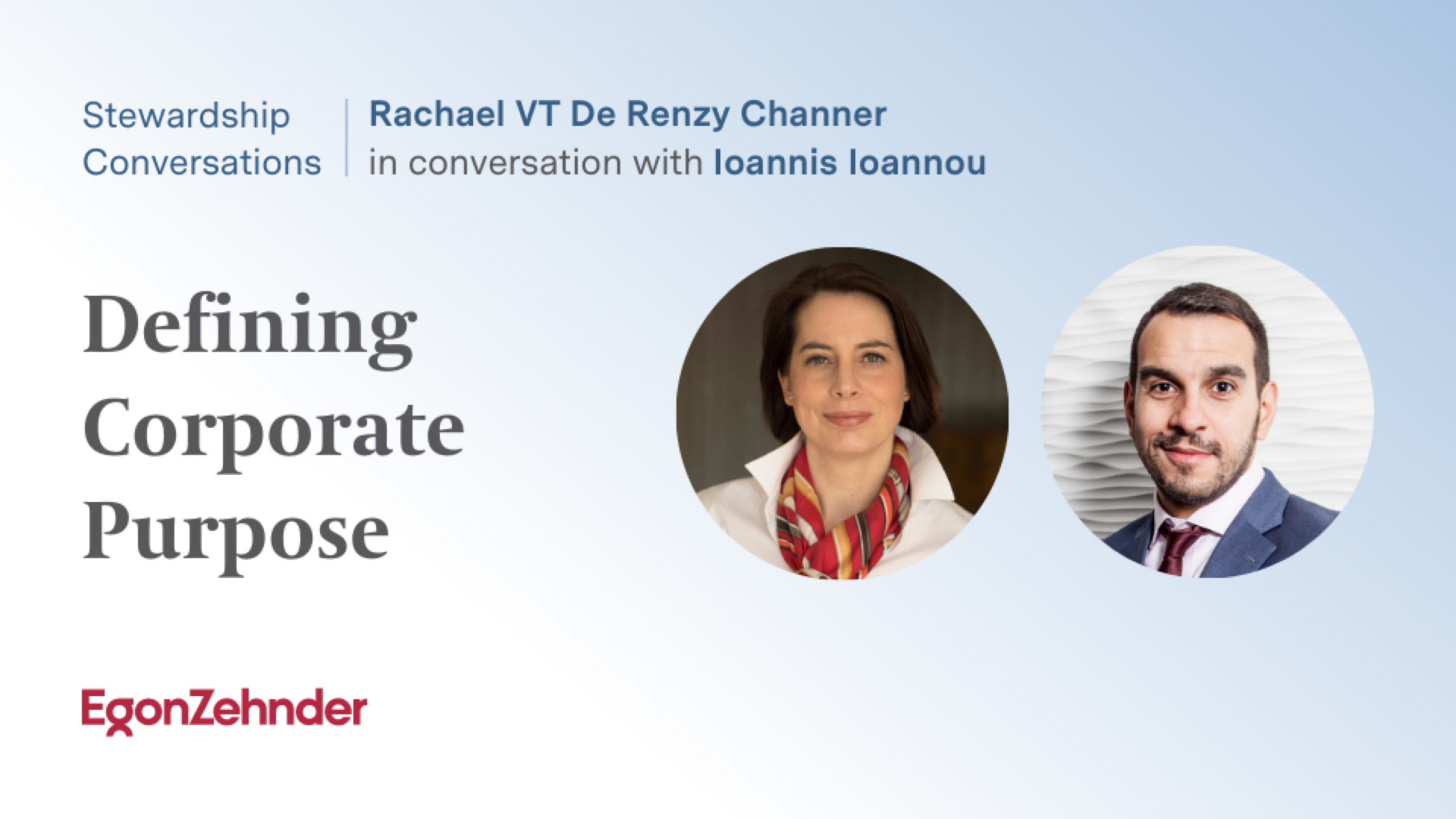If our time on this world is limited, why not use it to actively make it better? This simple yet powerful realization has been the driving force behind Professor Ioannis Ioannou's dedicated career in sustainability. Notably, his deepest inspiration comes from inside the classrooms he teaches, a place where students show “real thirst for change.”
In this installment of Stewardship Conversations, Ioannis calls for a reality check, emphasizing “it’s time to pay the bill” when it comes to climate change. He also shares valuable insights on how leaders can commit to advancing the sustainability agenda, stressing the imperative for organizations to make tough decisions regarding cost alignment.
Throughout our discussion, Ioannis consistently delved into the crucial influence of corporate purpose and culture in promoting sustainability, leadership traits that are critical for sustainability leaders, and how companies and boards can become “transition ready.”
Read on for the highlights:
What sparked your interest in sustainability?
I was graduating from my Ph.D. program during the financial crisis of 2008-2009, when it felt like the world was collapsing in so many ways. At the time, I would say I was having my own existential crisis. I was seriously wondering what I should be focused on. I was faced with making a lifetime commitment in terms of what I wanted to study and, most importantly, why I wanted to study it.
This was also at the time when all the environmental and social challenges the world was facing were becoming more pronounced, these issues landed on my radar of intellectual curiosity. So I said, “Well, if I’m going to devote my life, my career, and my intellectual capacity to studying something, I might as well try to understand how this institution we call business may or may not contribute to making the world a better place.”
We often talk about purpose in the context of organizations, but for me it was also about my personal purpose. Why am I going to stay in this profession? What impact do I want to have? What’s my own personal purpose? Some people find that purpose earlier or later in life, and I feel that at that point in time I had found mine.
How does corporate purpose and identity contribute to making a company a more sustainable business?
Corporate purpose is a difficult concept to wrap our heads around because purpose can be both positive and negative. Whose perspectives are we taking – those of the top executives, Middle managers, employees and board members, all of whom may have a different perception of where the company is going or why it exists.
I usually refer to sustainability as something more tangible. Environmental and social challenges are not a matter of perception. Climate change happens. How you’re perceived as a business and what you do may have an element of perception, but there are also scientific processes when we talk about environmental or social issues. The fact that we can do empirical analysis is more appealing, and I think corporate purpose can become more tangible if you try to measure it beyond statements, perceptions and surveys.
From a culture perspective, what would you say a transition-ready organization looks like?
As we know from many examples and even in prior transitions, shifting the culture of an organization is extremely difficult, and I think it requires both a bottom-up as well as a top-down approach.
- The first major factor in a bottom-up approach, if the goal is to build a culture of sustainability, is the need to convey that every single employee has a role to play. And that’s difficult because, for a lot of us, sustainability and these environmental and social issues have always felt like someone else’s responsibility. It’s everyone’s responsibility to consider these issues in every decision.
- The second is the fact that people may feel powerless. Some people might think, “what can I do? I’m just a frontline employee, I can’t change the organization.” But what they need to realize is that their actions have a ripple effect. They don’t only affect their own behavior and performance but also the people around them.
While we think about sustainability as this “big change”, in reality, it’s much more a series of smaller, localized changes that scale up. That’s why the bottom-up approach is so important to shifting culture, and executives need to know how to address the organization if they want to make that happen.
Can a strong “tone from the top” help make the bottom-up approach more effective?
In a sense, yes, “tone from the top” is important, in response to both internal and external pressures that organizations are facing to become more sustainable. And also in terms of leaders having the foresight to see and address emerging trends.
It’s also a risky business. To motivate people, you have to embody the value that you want to lead the organization towards. In other words, intentions matter, but so does execution. Perhaps that’s why we’re not seeing many leaders coming out with this ambition. You could have one leader come out and proclaim to run a sustainable business, and with the proper evidence, that leader becomes a sustainability superstar. Then you could have another leader do the same and with equally good intentions, but if the implementation fails for any reason, that leader will become a greenwashing superstar.
You speak about sustainability in very realistic terms, using phrases such as “it’s time to pay the bill.” and “cost correction”. How do corporate leaders tend to react when you use this language?
When I say “it’s time to pay the bill”, I’m essentially asking: Why do we have a sustainability problem in the first place? Why do we have a climate change or biodiversity or inequality problem? It’s because, in the past, we’ve abused, misused or wasted resources. We didn’t care about equality and now we have challenges with diversity, gender, pay equality, and so forth. All of these misuses and abuses have a cost, and the tough part of sustainability is this cost correction.
When I work with companies, I tell them, “Well, the upside is great, but the question is, are you ready? Do you have the foundation required to take advantage of the upside?” You’d be surprised that most of the time when I mention this duality, a lot of them have a very positive reaction, because understanding duality is what brings sustainability from theory to decision-making. The fact is there are difficult decisions to make around cost alignment, and understanding the costs associated with a carbon tax, when it will be implemented, and how it impacts your operations will help companies be more prepared.
What are two or three key traits or behaviors that can help leaders navigate the world of complexity?
- First, it’s the ability to see the bigger picture and think about the long-term. For many years, businesses have focused squarely on their own industry and on the short-term horizon. So we need leaders who can see the bigger picture, asking what is the role of my business, not only in the economic context, but in the broader social and environmental context and what that looks like in the long-term.
-
The second one is adaptability and flexibility because sustainability is a very complex domain to engage with, and one that encompasses issues that are constantly and rapidly evolving. -
The third component is having knowledge of the system’s underlying sustainability issues. Boards can have specialized experts, but individual executives and board members need to have at least a basic understanding of these topics if they want to have productive conversations.

What does it look and sound like when a board is in a good space and ready to make that transition?
There’s both a more formal and then less formal dimension to board preparedness. The formal dimension involves understanding what the board’s actual responsibility is when it comes to sustainability. Is there a subcommittee in charge of sustainability that the board oversees? Are there sustainability credentials that are considered as part of the selection process? Do you rely on specialists, or should everyone have a basic level of knowledge about these issues? Additionally, we also increasingly see compensation structures for executives that include environmental, social and governance or ESG metrics, so there are all of these formal structures and incentives that we think will inevitably make the board more prepared.
There are also the informal characteristics, seeing the big picture, being flexible and understanding the system. Board readiness also comes from having a fair balance between talking about long-term and short-term objectives or between financial and non-financial metrics. You have to be very practical, and I’ve seen great examples where boards are doing scenario planning, not only with respect to climate but also more forward-looking issues like biodiversity.
What inspires you for the future?
I am in the education sector, so on a daily basis I come into contact with students from across generations, but increasingly younger generations, who are motivated to make a positive change in the world. And this makes me quite optimistic considering the fact that 15 years ago, you’d have to convince someone that climate change is important.
Students are pressing us about what they can do and how they can accelerate change. So I’d say my biggest source of inspiration is the classroom, or the daily engagement with people who are either going to work for companies or set up their own companies to address these challenges. They have an increased level of awareness and real thirst for change, as well as the motivation to do something about it. That’s what gives me optimism on most days.
*****
Ioannis strikes a nuanced balance between a passionate drive for impactful change and a healthy pragmatism regarding the essential elements and mindset required for companies to progress in sustainability. Departing from the overly optimistic "Rainbows and sunshine" perspective, Ioannis brings realism to the forefront, acknowledging climate change as a pressing issue and recognizing our delays in acting. He still retains optimism and confidence in the potential for advancements.
With an increasing awareness of the need for a realistic and transparent sustainability action, Ioannis underscores the pivotal role of executive boards and leaders in addressing the “cost correction”. As we navigate these challenges, his insights offer valuable guidance for business leaders eager to instigate meaningful change within their organizations.
Engaging in conversation with Ioannis was inspiring. I really appreciated his direct-talking nature – saying things I don’t often hear people say out loud. I am left with his powerful conviction that despite the instinct for people to feel powerless in the face of such great challenges “every single employee has a role to play” and can create an important ripple effect in the system we are all trying to change.








